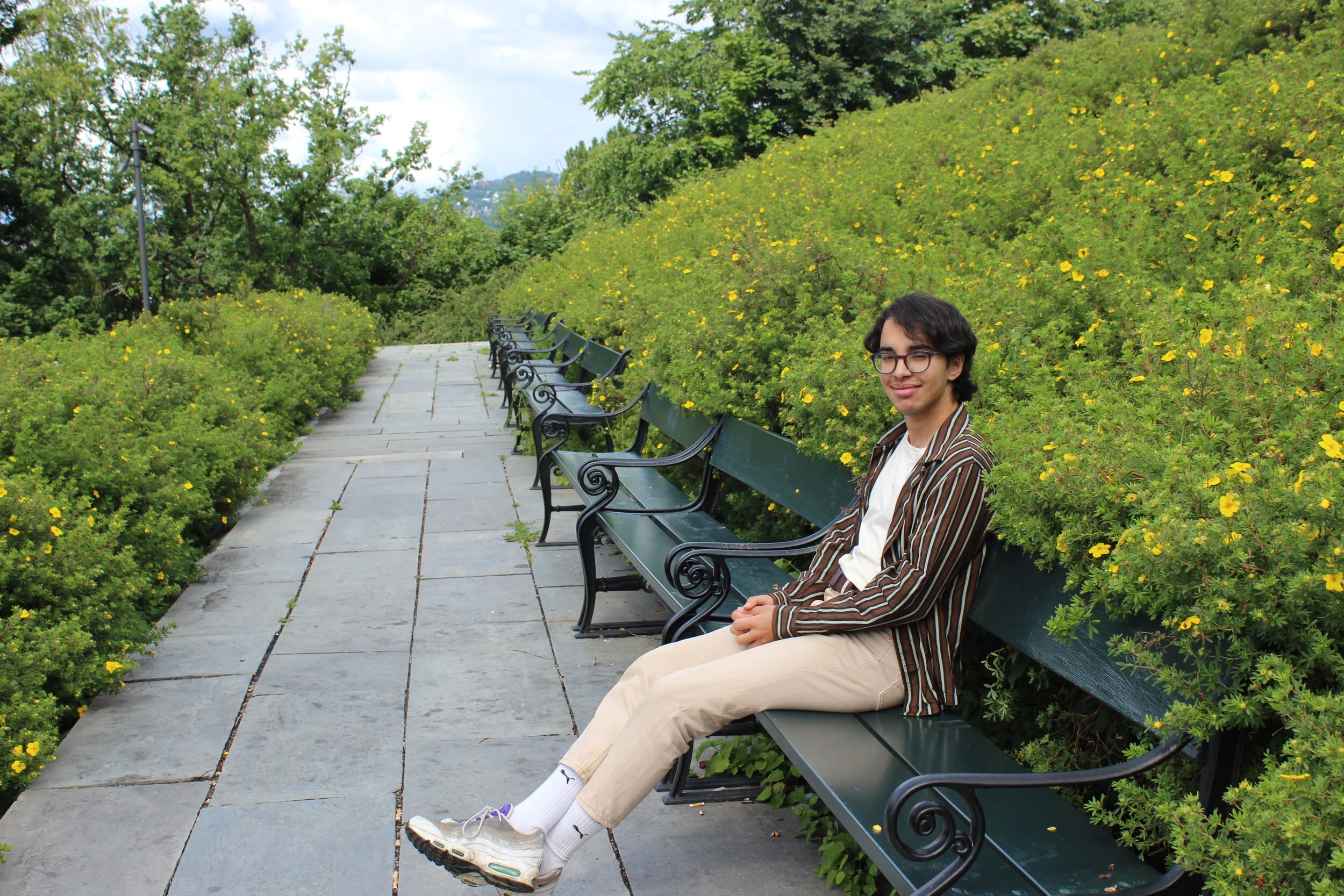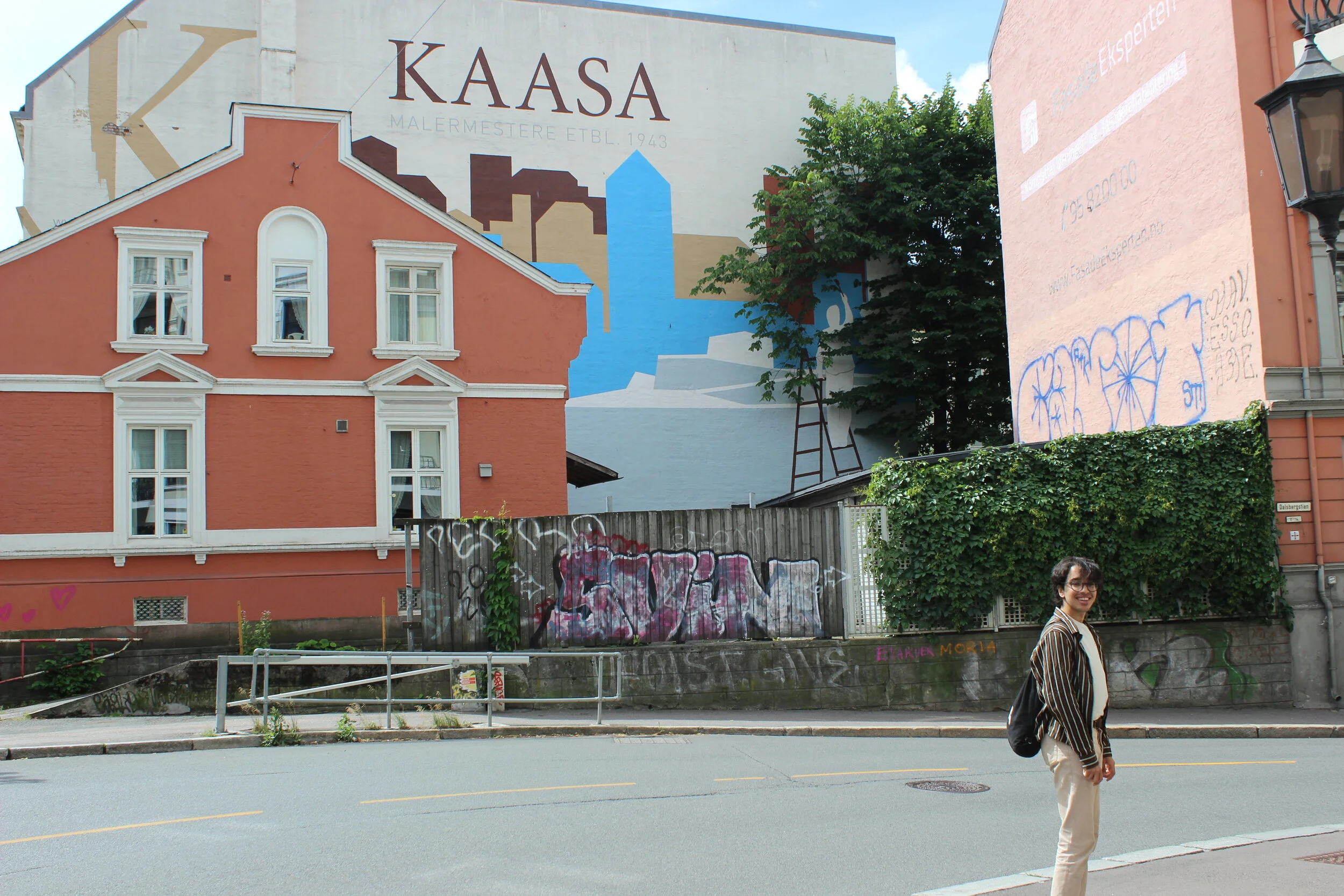Being 20 in 2020:
Pausing for thought in Oslo
As told to Mallika Aryal
Rami Chumber was born in Oslo to a Moroccan father and Indian mother. He’s active with Norway’s Socialist Left Party, and was meant to be spending summer in Paris when the pandemic hit.
You are not the first person I have brought to St. Hanshaugen park on a summer day like today. This is my home, and this park has been my playground for the last 20 years. We are in the middle of the city, but we are surrounded by greenery. This hill we're on is a fantastic look-out point. You can see the city centre from here, and the Norwegian fjords as far as the eye can see. Summer days in this park have a slow rhythm to them, but they start to thump at 5pm when the bars begin filling up.
My friends and I like to bring our mats and set ourselves down here. I have spent endless hours reading, listening to music, playing the lawn game Kubb or simply napping. In the evenings we grill sausages, eat strawberries and drink some beers. These evenings are long, and the light lingers until 10pm before we say goodbye to each other.
I am leaving my neighbourhood soon to move to Trondheim, some 500km from Oslo, to attend the Norwegian University of Science and Technology where I will be spending the next few years studying digital infrastructure and cybersecurity. As I plan my move, I have been thinking a lot about my life here in Oslo.
“I went to the local elementary school, which was very diverse. I didn’t have a reason to think I was different until I was in middle school.”
Bislett, my home, is young and diverse, full of students, young professionals, and young families. Jo Nesbø, the Norwegian crime writer, popularised the neighbourhood because the main character in his novels, Harry Hole, is from here. Nesbø describes Bislett as seedy, dirty and dangerous, but really it’s anything but. For me, my neighbourhood is bright, multicultural and happy.
My mother is from India and my father is from Morocco. I went to the local elementary school, which was very diverse. I didn’t have a reason to think I was different until I was in middle school. It’s as if one day, you start noticing the looks you get on the subway, you see people switching seats on buses, you hear the jokes at parties, and catch the comments friends’ parents and grandparents make. They are not outright offensive, but they hit you.
In my teens, I started listening to Karpe Diem, the Norwegian hip-hop band. They talk about fitting in, being different, and the challenges of integration in a predominantly white country. As I listened to them I realized these are also my own lived experiences: Født og bor I ett land du vil ha meg ut av, Pass deg, pass deg bunad bilr burka! (Born in a country, you want me out, Beware, beware, bunad (Norwegian national dress) will be burka!)
It has always felt like my Indian and Moroccan roots had second-tier status compared to Norwegian culture and heritage, which for a long time felt closer to where I am – both geographically and psychologically. As an adult, I’m becoming more curious about India and Morocco. This never happened during my childhood. I’m not sure whether that was because of the adults in my life deliberately wanting me to feel Norwegian – not to feel like an outsider – or my own subconscious wish to not feel different. I think everyone has a desire to feel like they have something in common with the people they socialise with, and culture is a big part of that.
Either way, I’d say my identity is mostly influenced by growing up here in Norway. It’s not really a melting pot and is pretty homogenous, but its cultural profile is pretty strong.
If your background is a source of discomfort – which was sometimes the case for me – then it’s easy to become disengaged from it. People say Morocco and India are an "interesting mix", but to a young kid, those remarks make you feel more like an animal on display than an actual human being.
“As an adult, I’m becoming more curious about India and Morocco. This never happened during my childhood.”
I think this made me associate interest in my heritage with self-importance—that being curious towards or knowing a lot about the cultures of my parents was somehow narcissistic. Or that it was impractical to those around me, and social interactions would go a lot more smoothly if my background wasn’t an issue.
Growing up with immigrant parents, I learned not to rock the boat. I was a bright kid in school and did well. Adults told me regularly how well I did and some part of me internalised this. I liked the endorsements from white people – I wanted to convince my friends’ parents that I am good even though I am not white.
There is so much talk about integration in Norway, but there are definite social barriers between immigrants and white Norwegians. I have paid more attention to this since getting involved with the Socialist Youth, the youth wing of the Norwegian Socialist Left Party. I believe integration is about power. The focus is always on how minority communities need to fit in, and how they should have a certain set of values, in a way that’s just not expected of white Norwegians.
“If your background is a source of discomfort – which was sometimes the case for me – then it’s easy to become disengaged from it.”
However, I honestly do think Norway is the best country in the world to live in. And that’s not because of the fjords, or nature, or the mountains. In Norway, we have something called dugnadsånd – this means the spirit of people come together to achieve something. Norway's response to the Covid-19 pandemic and the low infection rate has been a four-month-long dugnad because we listened to the epidemiologists and the scientists and kept each other safe.
Life had its rhythm but the pandemic has made us all pause. This summer has been so different to the last two, when I took the interrail with my friends all over Europe. We’ve been to Denmark, Germany, France, Hungary, Slovakia, Italy, Switzerland and the Netherlands. I got to experience Europe and I understood how linked we are, and why the EU keeps the states economically dependent on each other. The EU is such an effective institution – it can prevent wars, and more importantly, can form strong climate change policies. That said, I am fine with Norway not being in the Union because I believe it takes away from the idea that all policies should be rooted in what the people of a country want.
This summer I’d traded interrailing to learn French at a language school in Paris as part of my gap year, but I had to return to Oslo in March when the pandemic closed the borders. The Covid-19 pandemic seems so present, yet also so far away as I plan my move to university. It feels debilitating – it feels wrong to make big new plans – but life has to go on. I have a new phase ahead of me and I hope to question more, travel more, meet new people and continue to evolve.


